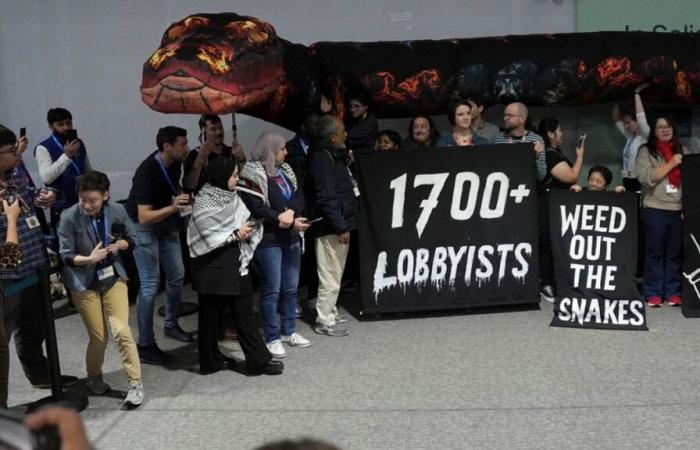If fossil fuel lobbyists were a country, they would make up the fourth largest delegation at the summit.
ADVERTISEMENT
A report released today reveals thatat least 1,773 fossil fuel industry lobbyists were allowed to attend the United Nations climate conference in Baku.
Analysis from the Kick Big Polluters Out (KBPO) coalition reveals that Fossil fuel lobbyists received more passes to COP29 than all delegates from the ten nations most vulnerable to climate change combined.
The coalition says the industry’s presence “overshadows” that of the people on the front lines of the climate crisis and who are suffering, in part, from the actions of oil and gas companies.
The only delegations that exceed them are those of Azerbaijan, host country of COP30, Brazil and Turkey.
“The fossil fuel lobby’s grip on climate negotiations is like a venomous snake coiling around the very future of our planet,” says KBPO member and Health of Mother Earth Foundation member Nnimmo Bassey .
“We must expose their deception and take decisive action to strip them of their influence and make them pay for their crimes against our planet. It is time to prioritize the voices of those fighting for justice and sustainability , and not the interests of polluters.
How did fossil fuel lobbyists get into COP29?
KBPO’s analysis shows that a large number of fossil fuel lobbyists have had access to COP29 within the framework of commercial associations. Eight of the ten business groups with the largest number of lobbyists are from countries in the North.
The International Emissions Trading Association is the one with the most, with 43 people at the top, including representatives of the oil majors TotalEnergies and Glencore. European business associations, including the Federation of German Industries and BusinessEurope, are among the ten associations with the most representatives from the fossil fuel industry.
Other lobbyists came with national delegations. Italy sent employees of energy companies Eni and Enel. Japan sent representatives from coal company Sumitomo, and Canada sent representatives from Suncor and Tourmaline.
The UK alone brought in 20 fossil fuel lobbyists, despite its attempts to position itself as a climate leader ( ) during this year’s negotiations.
Additionally, the analysis only considers fossil fuel lobbyists, not those from other sectors deeply involved in the climate crisis that might also be present, such as finance, agribusiness or transportation.
The story of fossil fuel lobbyists dominating the COP
HAS Dubailast year, a record 2,456 fossil fuel industry lobbyists were allowed to participate in the annual climate negotiations, almost four times more than at COP27 held the previous year in Egypt. They represented approximately 3% of the 85,000 participants at COP28. The move was sharply criticized by representatives of vulnerable nations and civil society groups, who said their presence compromised the integrity of the COP process.
This year, the number of participants at COP29 has been reduced in an attempt to curb the rapid growth of the UN climate conference. With approximately 70,000 people authorized to access the Baku summit, fossil fuel lobbyists represent approximately 1.5% of participants.
KBPO says fossil fuel representation at the UN climate negotiations has always been high, with industry representatives present since their inception. In 2017, countries representing nearly 70% of the world’s population called for these conflicts of interest to be addressed.
After constant pressure from civil society, a new rule was introduced last year, which requires people registering for talks to disclose their affiliations. Previously, they could participate without disclosing these affiliations, allowing them to go somewhat unnoticed.
“For nearly 30 years, these actors have hijacked negotiations, sabotaging any meaningful progress, while our communities in the South bear the brutal brunt of the climate crisis, and our voices remain marginalized in these crucial discussions,” says Rachitaa Gupta, of the Global Campaign for Climate Justice.
“No more compromise. These polluters must be shown the door and it is time for us, the communities of the South, those who have contributed the least to this crisis, but are suffering the most, to lead and shape real climate solutions and just rather than profits.”
Why are fossil fuel companies at COP29?
Kathy Mulvey, accountability director for the Union of Concerned Scientists’ climate and energy program, has monitored industry’s presence in UN discussions on health and safety for more than 20 years. climate.
“The massive presence of the fossil fuel industry at COP29 illustrates what is at stake: what oil and gas companies think they have to lose and how they can try to make money,” she explains. .
Ms. Mulvey says that while they continue to push to delay the phase-out of fossil fuels, they are also trying to co-opt the transition to clean energy by demanding government subsidies for technologies that are unlikely to play a role in the transition. achievement of 2030 climate goals. She adds that countries must resist any attempt by the fossil fuel industry to “divert funds” that should be dedicated to financing the fight against climate change that countries in the South need .
UCS draws attention to booths inside COP29 that it says claim “oil touches our daily lives in many different ways,” promote natural gas as “the cleanest of hydrocarbons,” as well as as well as corporate pavilion events sponsored by major oil and gas companies such as Chevron and ExxonMobil.
“Fossil fuel companies and their representatives should not have a seat at the climate policy negotiating table: allowing them this access is letting the cat among the pigeons,” says Mulvey.
“Companies like ExxonMobil, which have waged a decades-long campaign to deceive the public and policymakers and block or delay climate action, have shown time and time again that they cannot be trusted to as actors of good faith in the development of climate policy.”
Climate leaders call for urgent review of UN climate process
The report comes alongside an open letter signed by Ban Ki-moon, former secretary-general of the United Nations, Mary Robinson, former president of Ireland, Christiana Figueres, former head of climate issues at the UN, and other experts, calls for seven essential reforms to the conference of the parties process.
It highlights the need for rigorous monitoring of climate change financing, integration of the latest scientific data, smaller and more frequent meetings, improved implementation and accountability of climate goals and decisive action on equality, justice and the fight against poverty.
But it also highlights the need for strict eligibility criteria to exclude countries that do not support the gradual abandonment of fossil fuels and fairer representation. The letter draws attention to the 2,456 fossil fuel lobbyists who gained access to OP28 last year.
“The fact that there were many more fossil fuel lobbyists than official representatives of scientific institutions, indigenous communities and vulnerable nations reflects a systemic imbalance in the representation of the COP,” we read in the letter.
“At the last COP, fossil fuel lobbyists outnumbered representatives of scientific institutions, indigenous communities and vulnerable nations,” says Figueres.
“We cannot hope to achieve a just transition without significant reforms to the COP process that ensure fair representation of those most affected.”






